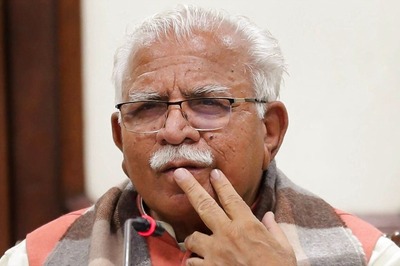
views
New Delhi: Innovation, inspiration and insights are perhaps the three I’s that gets India’s generation next buzzing with ideas and passionate about their jobs.
When it comes to inspiration, for some, it comes in the form of women. “I was a shy and introspective kid until I discovered women. In college, I spent 90 per cent of my time thinking about them and 10 per cent of the time trying to do something about it," jokes ad guru and CEO of Genesis Films Prahlad Kakkar.
"So, instead of making ad films, I guess I always wanted to become a pornographer,” adds Kakkar, who quit an offer to join the financial services sector because of the lack of women in the sector.
His foray into the ad world and moment of epiphany came later when he chanced upon the best pair of legs he’d ever seen at the reception of an ad agency.
For others, it was their love of computers that got them interested in their job in the first place. “When I first saw the Macintosh PC, angels started singing, the clouds parted-it was a religious experience," suggests Managing Director, Garage Technology Ventures, Guy Kawasaki.
"Working at Apple was like going to Disneyland and getting paid to do so. I think you should go to work for companies that make products that you love. That was the genesis of Yahoo, Google and Apple,” adds Kawasaki, one of the original Apple Computer employees responsible for marketing of the Macintosh in 1984 and a Silicon Valley venture capitalist.
So, how do you get innovative in the stock market and build the ability to pick the dark horses and build financial freedom. “I had a software programming background and when I returned to India to take over the family stock trading business, the Indian market was all about cement stocks, something which I didn’t understand," says BSE, Member Ramesh Damani.
"The 'Eureka' moment happened, when Infosys went public and as a software professional I understood the opportunity that lay ahead. So, life has to be lived upwards but understood backwards,” he adds.
Inspiration and passion can also come from a nice pair of legs or something that you wear on your legs - like socks. “We began by exporting 30,000 socks that were packaged, exported and stacked directly on the shelves in German shops. These were being sold at a 500 per cent markup and that got me wondering."
"I found that most of the businessmen in the Marwari culture did not have a proper brand for their products. All they cared about was owning factories. The psychology was that you would put your money where you could see it and no Marwari wanted to put money where they couldn’t see it. It was then that I actually fell in love with brands and the Internet actually enabled that love to blossom,” says Founder and CEO, Contests2win.com, Alok Kejriwal.
PAGE_BREAK
However, for other passionate people, their line of work actually happened due to the practicality of the job. After getting his PhD in Computers, GM, Information Management Software Ambuj Goyal, realized that he wasn’t ready to enter the real world. “So, I considered teaching and thought that I should also take a job which would allow me to do my research at the same time. So, I chose a company with the deepest pockets-IBM,” says Goyal.
But is it important for corporates to encourage the spirit of entrepreneurship within the organization? And how do corporates go about mentoring their employees to be more passionate?
“In my case, I had tremendous freedom working under Steve Jobs,” says Guy, who incidentally worked for Apple twice in his career. “It starts by convincing employees that they are not working for IBM to make money. You’re not at IBM for a good time; you’re there for a long time. So, if that passion to work for a company is not there, many employees will and do leave the organization,” adds Goyal.
“Mentoring is not about supervision. It is about recognizing talent, hunger, passion and encouraging it while giving credit. Give a person credit for something they have thought of, this is valued far more than money because they can make far more money from that credit,” says Prahlad.
Generation Next is no longer embarrassed about being Indian and earning more money than their parents. “Kids today are comfortable about being Indians since they are not being looked upon as migrant labourers. They are going out and making a difference. If you’re not thinking young you are going to be on the shelf soon,” suggests Kakkar.
The VC community in Silicon Valley is already taking note of Indian entrepreneurs. “We will always pick a business proposal from an Indian as opposed to anyone else because of the awesome reputation of an Indian entrepreneur. I have honestly never met a dumb and lazy Indian. We don’t tell anyone to put their thinking hat on anymore - we say put you’re thinking turban on!” says Guy.
But even today, a lot of people spend most of their productive time in jobs that they don’t like very much. Much of that could be attributed to the stigma that society attaches to failures. “If you want to change your life, you have to do it yourself through self action. Steve Jobs once said that, 'In your life, if you stay hungry and foolish-you’ll do fine',” suggests Damani.




















Comments
0 comment